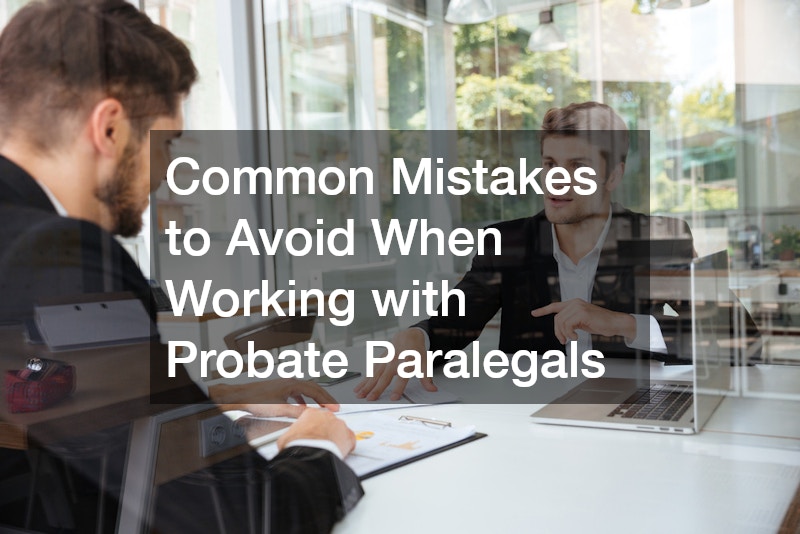
Understanding the role probate paralegals play in estate management and how to collaborate effectively can significantly smooth legal processes. Probate paralegals are often involved in the drafting and review of legal documents, and their expertise can help in ensuring that estate matters proceed efficiently. By avoiding common mistakes and fostering a collaborative work environment, legal professionals can make the most of their paralegal's skills.
Video Source
One of the most common issues faced by probate paralegals is dealing with unclear or incomplete instructions. Vague instructions can lead to errors and unnecessary delays, which can complicate the estate management process. Providing clear, concise, and detailed instructions helps in minimizing mistakes and ensures that tasks are completed accurately.
When instructions lack specificity, it becomes challenging for probate paralegals to execute tasks efficiently. Paralegals rely heavily on the directions they receive from attorneys, and clarity is crucial for effective task execution. Establishing a clear communication channel can significantly enhance the working relationship and improve output quality.
Clear instructions also help in managing workloads effectively. With precise directions, probate paralegals can prioritize their tasks based on urgency and importance, leading to better time management. A well-organized set of instructions can streamline processes and lead to more successful outcomes.
Utilizing excessive legal jargon when communicating with probate paralegals can cause misunderstandings. While legal terminology is essential, overusing it without context can lead to misinterpretation. It is vital for legal professionals to balance technical language with clear explanations to ensure comprehension.
Probate paralegals, although familiar with legal terms, may not always have the same depth of understanding as attorneys. Clearly explaining legal concepts and context in simpler terms can facilitate better understanding and reduce mistakes. Effective communication involves not only the use of legal terms but also the ability to translate complex concepts into actionable tasks.
Ensuring that team members are on the same page requires clear, jargon-free communication. While some legal language cannot be avoided, unnecessary complexity should be minimized. By focusing on clarity and comprehension, misunderstandings can be easily avoided.
Providing timely feedback is critical when working with probate paralegals. Constructive feedback empowers paralegals to refine their skills and enhance their performance. It also helps in building a more cohesive and effective working environment.
Regular follow-ups are essential to maintain effective ongoing communication. This practice ensures that any emerging issues are promptly addressed and resolved. It also demonstrates a commitment to collaboration and continuous improvement.
Additionally, follow-ups provide an opportunity to reassess priorities and make necessary adjustments to workflows. By fostering an environment of open dialogue, both legal professionals and paralegals can work towards common goals more productively. Effective feedback and follow-ups are essential components of a successful working relationship.
Providing comprehensive documents is crucial for accuracy in legal filings. Detailed documentation ensures that probate paralegals have all the necessary information to perform their tasks effectively. This not only minimizes the risk of errors but also speeds up the legal process.
Comprehensive documentation includes all relevant details, such as client information, case notes, and previous correspondence. Ensuring that probate paralegals have access to complete records can significantly improve their efficiency and effectiveness. Proper documentation also provides a reference point for resolving potential discrepancies.
Detail-oriented instructions are beneficial for drafting precise legal documents. Complete and comprehensive records allow paralegals to verify facts and cross-check details. This ensures consistency and accuracy in the work produced, ultimately leading to successful case resolutions.
Setting and communicating realistic timelines is essential for managing expectations in probate matters. Clear deadlines help paralegals prioritize tasks and manage their time effectively. By providing specific due dates, legal professionals ensure that crucial work is completed on schedule.
Realistic timelines promote better planning and efficient workflow. Probate paralegals can allocate adequate time for each task, minimizing stress and ensuring quality output. Deadlines also serve as motivation, prompting timely completion and reducing procrastination.
Communicating deadlines clearly also helps in avoiding last-minute rushes. It allows sufficient time for thorough review and correction of any potential errors. Clear deadlines lead to a more organized, efficient, and predictable workflow, benefitting the entire legal team.
Identifying and communicating tasks that need immediate attention ensures efficiency in probate practices. By specifying priority tasks, probate paralegals can focus their efforts on areas that require urgent attention. This helps address critical issues promptly and improves the overall service provided to clients.
When tasks are prioritized clearly, probate paralegals can allocate resources strategically. This ensures that the most pressing matters are handled first, reducing the risk of delays. Prioritization also supports better workload distribution and promotes a balanced work environment.
Recognizing priority tasks also allows for better strategic planning. Probate paralegals can make informed decisions about task order and timelines, leading to improved performance. By maintaining clear priorities, legal professionals can ensure that critical deadlines are consistently met.
Mutual respect is foundational to a collaborative working relationship with probate paralegals. Recognizing the value and expertise that paralegals bring to the table fosters a positive work environment. Acknowledging their contributions can greatly enhance collaboration and improve service delivery.
By treating probate paralegals as valued team members, legal professionals can build trust and encourage greater initiative. Respectful interactions lead to higher morale and job satisfaction among paralegals. This, in turn, cultivates a committed and motivated workforce.
A successful partnership with probate paralegals hinges on effective communication, clear instructions, and a respectful and collaborative working relationship. By avoiding common mistakes and prioritizing clarity and respect, the legal process of estate management can be significantly enhanced. Fostering a supportive and understanding work environment allows all parties to work towards shared goals efficiently.
.